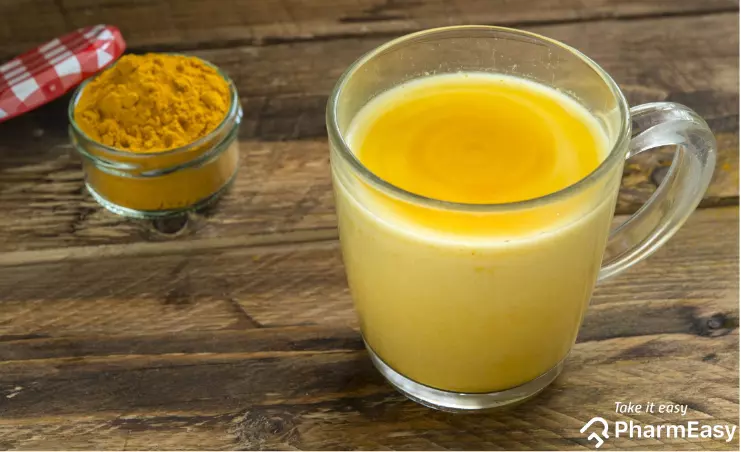Amazing Health Benefits of Turmeric Milk!
By Dr Prachi Garg +2 more

Get,

to manage your symptom
Get your,


4 Cr+ families
benefitted

OTP sent to 9988776655



You’ve successfully subscribed to receive
doctor-approved tips on
Whatsapp

Get ready to feel your best.

Hi There,
Download the PharmEasy App now!!


Register to Avail the Offer
Send OTPBy continuing, you agree with our Privacy Policy and Terms and Conditions

Hi There,
Sign up on PharmEasy now!!
Trusted by 4 crore+ families

OTP sent to 9988776655



You have unlocked 25% off on medicines




Code: NU25

Comments


Leave your comment here
By Dr Prachi Garg +2 more
Table of Contents
Turmeric Milk, also known as ‘Haldi ka Doodh’ or ‘Golden Milk’, is a simple, yet powerful drink that has been used for various health benefits.
From strengthening immunity and reducing inflammation to improving digestion and promoting better sleep, this golden drink offers a range of health advantages. Let’s explore the science behind why adding turmeric milk to your daily routine can be so beneficial.

Let’s understand why making turmeric milk a daily ritual can boost your health.
Friendly Reminder: The information shared here is for educational purposes only and the reader should consult a registered medical practitioner before implementing any changes to their health routine.

Turmeric contains curcumin, which has been shown in research[10] to be highly effective in reducing inflammation.
Curcumin works by inhibiting key enzymes like cyclooxygenase-2 (COX-2), lipoxygenase (LOX), and inducible nitric oxide synthase (iNOS), which play a role in inflammation. This makes turmeric milk especially beneficial for those dealing with acute or chronic pain, swelling, and other inflammation-related issues[3].

Curcumin in turmeric milk is also a potent antioxidant. It helps protect the body from damage caused by free radicals, reducing some risk factors of chronic conditions like heart disease and cancer [3].

Turmeric milk can also help boost immunity. With its natural anti-bacterial, anti-viral, and anti-fungal properties, it helps protect the body from various infections[11]. Many doctors recommend having a teaspoon of turmeric in a glass of warm milk daily to fight the common cold.

Turmeric milk benefits individuals with diabetes, as the curcumin present in turmeric helps regulate blood sugar and may delay the onset of type 2 diabetes when paired with a healthy diet and an active lifestyle. Type 2 diabetes occurs when the body’s cells don’t respond well to insulin, leading to high blood sugar. Curcumin reduces inflammation, which helps maintain better blood glucose levels. Those with or at risk of diabetes should choose unsweetened turmeric milk[2].

Curcumin, the antioxidant in turmeric, helps protect against heart diseases and diabetic cardiovascular complications. It may also help lower bad cholesterol levels and may offer some protection from harmful changes in blood vessels caused by atherosclerosis[12].

Turmeric milk benefits individuals with cancer as the curcumin present in turmeric interferes with cancer cell growth, making turmeric milk a healthy addition for those at risk. While it’s not a cure or treatment, it can be a beneficial part of a balanced diet, unless advised otherwise by a healthcare professional[3].

Curcumin has positive effects on brain health, helping prevent the buildup of amyloid plaques associated with Alzheimer’s disease[4]. It can complement prescribed treatments and therapies for better cognitive function.
From my perspective, curcumin, present in turmeric may actually help improve memory and attention in adults who don’t have dementia. Studies have shown that taking 90 milligrams of curcumin, found in turmeric, twice a day for 18 months might have a positive effect on brain function[13], making it easier to remember things and stay focused.
Dr. Siddharth Gupta, B.A.M.S, M.D (Ayu)

Curcumin boosts brain-derived neurotrophic factor (BDNF) and supports the levels of neurotransmitters like serotonin and dopamine, potentially helping patients with depression[5].

The antioxidant properties of curcumin in turmeric help prevent cellular damage, slowing down visible signs of ageing like fine lines and wrinkles. It may also encourage new cell growth[6].

Turmeric aids digestion by reducing bloating and promoting bile production in the gallbladder. It’s commonly used in Ayurveda to treat pancreatitis, along with other herbs and dietary changes[3].
I might disclose some of curcumin’s cool superpowers! Studies[14] show that it might be effective against Helicobacter pylori, a bacterium that causes tummy troubles like gastritis and ulcers. It might actually stop the growth of H. pylori and help get rid of it from infected mice and help repair the damage caused by the bacteria in the stomach.
Dr. Anuja Bodhare, B.A.M.S, M.D (Ayu)

Turmeric’s antioxidants can be beneficial for those suffering from glaucoma and cataracts, supporting eye health[7].

Turmeric’s anti-inflammatory, antimicrobial, and antioxidant properties help heal wounds, prevent acne, fight eczema and psoriasis, reduce scars, and give skin a natural glow[1].

Curcumin may reduce pain and improve joint function in those with rheumatoid arthritis, while also supporting overall bone health[8].
Milk is packed with essential nutrients like calcium, vitamin D, B vitamins, potassium, and omega-3 fatty acids, making turmeric milk a nutritious and complete drink.

A warm glass of turmeric milk before bed can help you relax and sleep better[9]. However, for long-term sleep issues, consult a doctor as it’s only a supportive addition.
Also Read: Natural Home Remedies for Breast Pain
In large amounts, curcumin may cause stomach pain in some people, this may be accompanied by nausea and cramping. This kind of overdose is highly unlikely with regular turmeric powder or turmeric milk, as the amounts in both of those are safe enough for most people. Make sure the turmeric used is free from adulteration.
Other than this, there aren’t many serious reactions to worry about with turmeric milk. In case you are lactose intolerant, you should avoid store-bought or readymade turmeric milk, as it can set off a serious allergic reaction. People with known allergies should only consume self-made turmeric milk using allergy-safe ingredients.
Here’s a quick recipe to make this drink.
Also Read: Natural Home Remedies For Dark Neck
Also Read: Tamarind (Imli): Uses, Benefits, Side Effects and More!
A simple glass of turmeric milk has many health benefits that many of us may overlook. From helping in digestion to improving sleep, ‘haldi ka doodh’ can be really beneficial to overall well-being.
Turmeric milk is believed to have calming properties, primarily due to its potential to reduce inflammation and soothe the nervous system. Many people find drinking warm turmeric milk before bedtime can promote relaxation and improve sleep quality.
Yes, turmeric milk can be consumed daily, especially as part of a balanced diet. However, it’s essential to use it in moderation and be mindful of any potential interactions with medications or existing health conditions. Consulting a healthcare professional is advisable, particularly if incorporating it into a daily routine.
Turmeric milk is generally considered safe during pregnancy when consumed in moderate amounts. However, pregnant women should consult their healthcare provider before adding any new ingredients to their diet, including turmeric, to ensure it aligns with their individual health needs.
Yes, lactose-intolerant individuals can enjoy turmeric milk by using dairy-free milk alternatives like almond milk, soy milk or coconut milk. These options provide the same benefits without the lactose found in regular cow’s milk.
Turmeric milk’s anti-inflammatory and antioxidant properties may provide relief for cough and common cold. The combination of turmeric and warm milk can soothe the throat and promote overall comfort during respiratory illnesses. This can be used as a supportive measure along with prescribed treatment.
Turmeric milk is known for its soothing and anti-inflammatory properties, which may help calm the body and mind. Drinking it before bedtime can promote relaxation, support better sleep, and help in overall wellness15.
Turmeric milk may offer several benefits for women due to its anti-inflammatory and antioxidant properties. It might help support hormonal balance, improve bone health, and ease menstrual discomfort. Drinking it regularly may also boost immunity, promote healthy skin, and support overall wellness. However, it is advisable to seek medical advice before consuming it, especially for those with underlying health conditions or during pregnancy.
Disclaimer: The information provided here is for educational/awareness purposes only and is not intended to be a substitute for medical treatment by a healthcare professional and should not be relied upon to diagnose or treat any medical condition. The reader should consult a registered medical practitioner to determine the appropriateness of the information and before consuming any medication. PharmEasy does not provide any guarantee or warranty (express or implied) regarding the accuracy, adequacy, completeness, legality, reliability or usefulness of the information; and disclaims any liability arising thereof.
Links and product recommendations in the information provided here are advertisements of third-party products available on the website. PharmEasy does not make any representation on the accuracy or suitability of such products/services. Advertisements do not influence the editorial decisions or content. The information in this blog is subject to change without notice. The authors and administrators reserve the right to modify, add, or remove content without notification. It is your responsibility to review this disclaimer regularly for any changes.
Comments

Leave your comment...

View all comments(3)
You may also like
Can a patient suffering from high cholesterol and thyroid disease consume turmeric milk?
Hi Amrapali
A patient suffering from high cholesterol can use low-fat milk to prepare turmeric milk. There is no absolute contraindication for drinking turmeric milk in a thyroid disease but if a person has an intolerance to milk proteins, he/she should not consume turmeric milk. If you have been advised to avoid dairy products you can opt for oat milk or almond milk after consulting with your doctor. Stay healthy and happy.
Can we add only turmeric to the milk and lemon juice